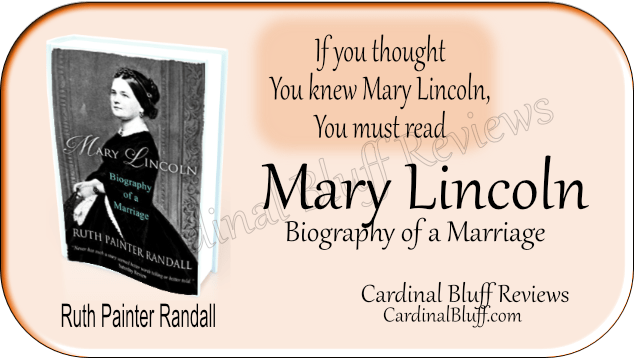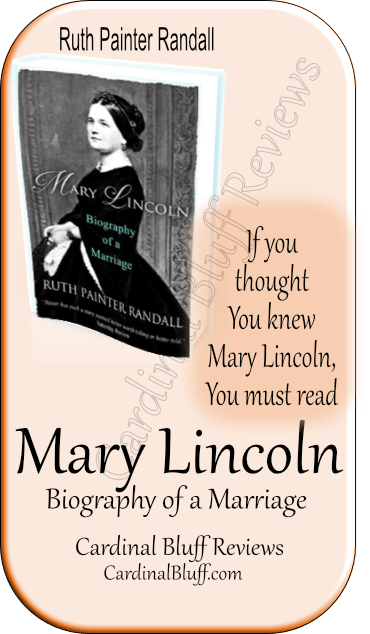

Story of A Marriage
A book full of victory and sadness. One point of personal sadness is that this book was first published in 1953, yet I never saw it until this year with my Kindle Unlimited membership!
With documentation, the author weaves a beautiful story of a marriage. Mary and Abraham Lincoln were matched in the variety of ways which contribute to the togetherness that should be marriage. They stood ready to defend one another, had their ‘inside’ jokes and shared visions for family and future. Their faith in God was derided and challenged, yet stayed firm. Even today, over one hundred years later, their faith is discussed, dissected and challenged. That faith inspired me all through the book.

From Different Worlds
Certainly, the specifics of their upbringing may differ. Abe Lincoln was reared by the rough pioneer lifestyle common among folks of his age. These people had intellect or they wouldn’t have survived the rough conditions that come with breaking into new country. They shouldn’t be considered impoverished because they had few THINGS. The desire for culture that Mary found in Lincoln wasn’t a new dna wrinkle with that one man; somewhere in his roots lay the beginnings. The Lincoln family didn’t own slaves — they didn’t own much of anything, but the experience of being very poor and made to feel ‘lower’, may have influenced Lincoln’s opinions and choices when he was grown. The author documents a sensitive and sympathetic man who would have been repulsed by slavery.
Mary’s home life was pretty grand compared to Mr. Lincoln’s. (In an aside, according to the author’s research, she never called him Abe, but most usually, Mr. Lincoln. This would have been common and appropriate among genteel ladies of her era) The Todd family did own slaves in Kentucky, but Mary’s grandfather supported gradual emancipation of the slaves before any freedom was a popular opinion. The black people who took care of Mary and her siblings had a certain amount of tyrannical power over the children, even though they were officially slaves. The author documents Mary’s sympathetic opinion for good treatment of the slaves. Later, she was extremely supportive of her husband’s proclamation to free slaves. Sadly, her political and social enemies spread rumors that surely a daughter of the south would be pro-slavery and pro-secession.
Standing by their families
Despite the differences on their background, along with the objections of family due to these differences, Abraham and Mary found attraction and devotion to one another in their similar interests, intellects and core values.
When Mary’s family was inclined to hold grudges about the war, both Abraham and Mary embraced the offended ones in their grief. They shared the grief of family members killed during the war and bore no grudges back when family lashed out. When Abraham’s family had needs, both were inclined to do what they could to keep his parents (including step-mother) comfortable. After Abraham’s death, Mary still sent support to his step-mother.
Marriage Takes Two
They maintained familial tenderness in their address of one another after their children were born. He called her Mother and she called him Father. They were absolutely supportive of one another when their children died young. This supportive behavior often left each almost alone because they didn’t support themselves. They equally adored and indulged their children with their TIME as well as whatever tangibles they were able to provide. There were detractors among their colleagues and family who disagreed with the devotion that Mary and Abraham had toward these children.
The Lincolns had many problems to face in their marriage. Their devotion to one another kept them on the same side despite family resistance, grief and stress of the presidency. They bore the burden of 19th century household logistics along with everyone else!

19th Century was harsh living
The author writes eloquently and with detail about the actual family life lived by Mary and Abraham Lincoln as he occupied the highest office in the land. The physical crudeness of the affluent American home during these times was shocking. We are, today, pressed to sanitize and wash and even radiate to protect and promote cleanliness and health. Yet, typhoid and small pox seemed to be EXPECTED even in the White House.
Personal Political Cruelty
Perhaps I couldn’t have born the sadness earlier as I read of political cruelty of the 19th Century. Without the benefit of social media, political competition and vile personal haters fed their poisoned opinions and tales to gossips to hurt and attempt to destroy.
Maligners attacked Mary Lincoln to her face. They snubbed her as being countrified without checking the facts of her genteel upbringing. No doubt that ladylike experience didn’t expose her to much of the metropolitan lifestyle. Her midwestern (western still in the 1800’s) lifestyle was moral, well-fed and amply dressed, yet there were small things that her ‘big city’ contacts lived every day that were new to her.
Further, the critics took advantage of her naivete, sensitive, ‘high strung’ personality to set her off in defense of her husband and her culture. While they couldn’t crush her husband with their criticism, they did manage to over-stress Mary and use her to make more trouble.
The Non-historian who lied
I was aghast at the blind acceptance of one man’s word on Lincoln’s spiritual beliefs. The accepting rabble and upper crust had as much access to Lincoln’s spoken expression as they did to the man who was considered his friend and colleague. But as continues to this day, the truth if often much less stimulating than the lie.
This book made my heart hurt for this family, so significant in our history. Today, we deal with social media and think it is often cruel. I can’t imagine the loneliness the Lincoln’s experienced to be rejected and have a very small ‘tribe’ compared to the tribe we can have through internet connection today.
If you thought you knew Abraham Lincoln’s wife, you must read Mary Lincoln, A Biography of a Marriage

Remember our author friends benefit from reviews about their art. Subscribers can download their free copy of Book Notes to keep track of review notes. And have ongoing access to other new things that will be coming to the Resource Library at Cardinal Bluff.

Thanks for putting this book on my radar! I’ve read books on the President but like you hadn’t heard of this one. It sounds very interesting.
Wow, after reading this, Mary Lincoln is on my list. They did not have an easy life! Thanks for sharing.